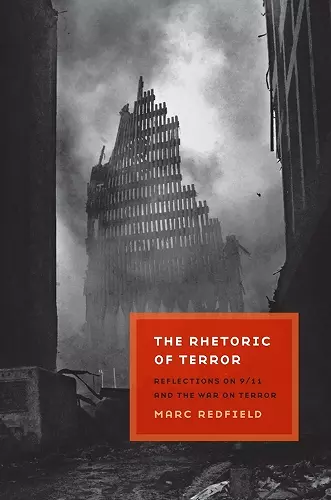The Rhetoric of Terror
Reflections on 9/11 and the War on Terror
Format:Paperback
Publisher:Fordham University Press
Published:7th Sep '09
Currently unavailable, and unfortunately no date known when it will be back
This paperback is available in another edition too:
- Hardback£66.00(9780823231232)

The terrorist attacks of September 11, 2001, did symbolic as well as literal damage. A trace of this cultural shock echoes in the American idiom “9/11”: a bare name-date conveying both a trauma (the unspeakable happened then) and a claim on our knowledge. In the first of the two interlinked essays making up The Rhetoric of Terror, Marc Redfield proposes the notion of “virtual trauma” to describe the cultural wound that this name-date both deflects and relays. Virtual trauma describes the shock of an event at once terribly real and utterly mediated. In consequence, a tormented self-reflexivity has tended to characterize representations of 9/11 in texts, discussions, and films, such as World Trade Center and United 93.
In the second half of the book, Redfield examines the historical and philosophical infrastructure of the notion of “war on terror.” Redfield argues that the declaration of war on terror is the exemplary postmodern sovereign speech act: it unleashes war as terror and terror as war, while remaining a crazed, even in a certain sense fictional performative utterance. Only a pseudosovereign—the executive officer of the world’s superpower—could have declared this absolute, phantasmatic, yet terribly damaging war. Though politicized terror and absolute war have their roots in the French Revolution and the emergence of the modern nation-state, Redfield suggests that the idea of a war on terror relays the complex, spectral afterlife of sovereignty in an era of biopower, global capital, and telecommunication.
A moving, wide-ranging, and rigorous meditation on the cultural tragedy of our era, The Rhetoric of Terror also unfolds as an act of mourning for Jacques Derrida. Derrida’s groundbreaking philosophical analysis of iterability—iterability as the exposure to repetition with a difference elsewhere that makes all technics, signification, and psychic life possible—helps us understand why questions of mediation and aesthetics so rapidly become so fraught in our culture; why efforts to repress our essential political, psychic, and ontological vulnerability generate recursive spasms of violence; why ethical living-together involves uninsurable acts of hospitality. The Rhetoric of Terror closes with an affirmation of eirenic cosmopolitanism.
"A stimulating tour de force, The Rhetoric of Terror provides a brilliant lexicon of central keywords of our recent political life. Redfield's analysis of '9/11,' 'Ground Zero,' 'the war on terror' and other powerful slogans traces the performative paradoxes that have enabled these phrases to do such terrible work." -- Martin Harries New York University "Topics include the attacks as a mediated spectacle." -The Chronicle of Higher Education "The Rhetoric of Terror exhibits the kind of patience it finds in the literature of testimony: an "endless, scrupulous patience with linguistic deviance and mediation." Marc Redfield unpetrifies the language of emergency, showing us how a single name-date ("9/11") or place-name ("Ground Zero") can function at once as monument, wound, alarm, and oubliette. And in a stunning genealogy of the concept, he recounts how "terror" has haunted both sovereignty and theory from the French Revolution to the present. This is the most wakeful book yet about the war on terror, keeping watch with its subject intently enough to ravel out its many self-divisions and the urgent demands they harbor. " -- -Paul K. Saint-Amour University of Pennsylvania Author of The Copywrights: Intellectual Property and the Literary Imagination "/The Rhetoric of Terror/ is a resolutely convincing case for the power of theory in understanding and contesting the "peculiar speech acts" that sovereign power has enacted and embodied in response to 9/11 and the exceptional conditions it has been used to justify. Redfield's deep commitment to the lessons of Derrida and his knowledge of the major European philosophical formulations of war and terror from 1789 to the present enable him to provide an indispensable analysis of what he eloquently calls "the unruly figurativeness of war". War is a concept that is hideously real, and one that cannot be left in the hands of politicians and combatants. Perhaps the importance of theory for ordinary life has never been greater; no one makes a clearer case than Redfield for the urgent application of critique to the recent and current languages of political and military self-accreditation." -- -David Simpson University of California, Davis "A masterly elaboration of post-structuralist thought on the subject." -Times Higher Education "A very smart and interesting pair of essays reflecting on the cultural significance of 9/11 and the idea of a war on terror." -- -Jonathan Culler Cornell University
ISBN: 9780823231249
Dimensions: unknown
Weight: unknown
148 pages